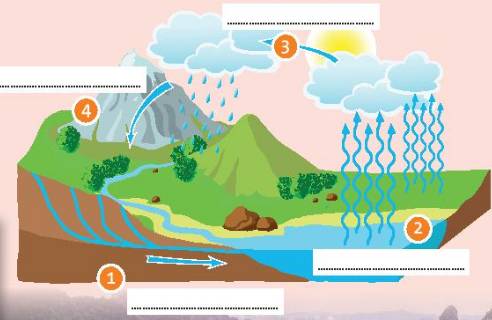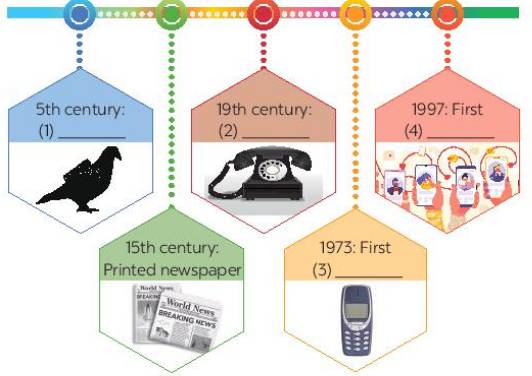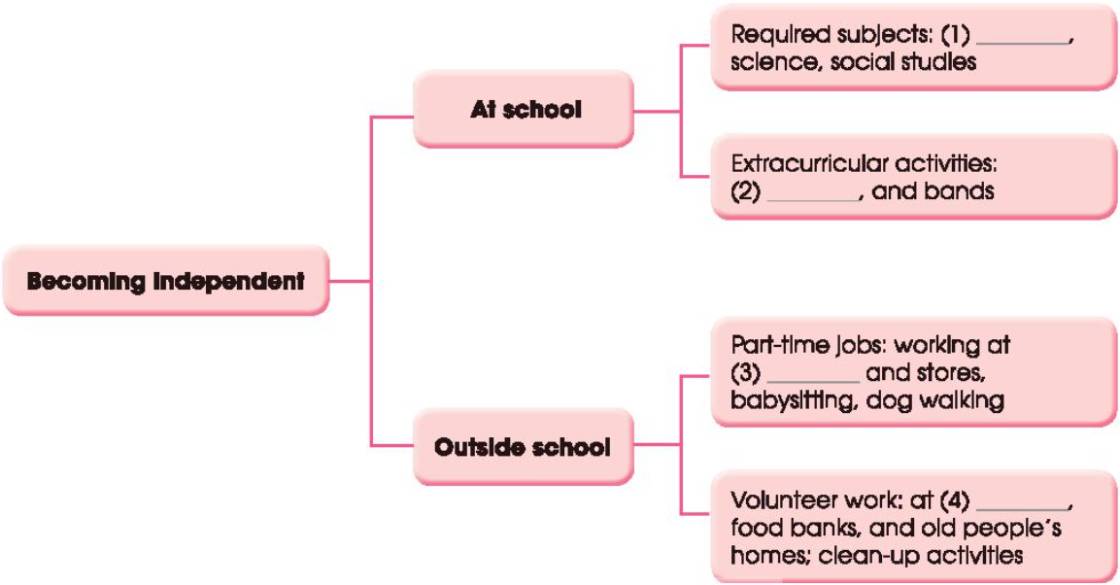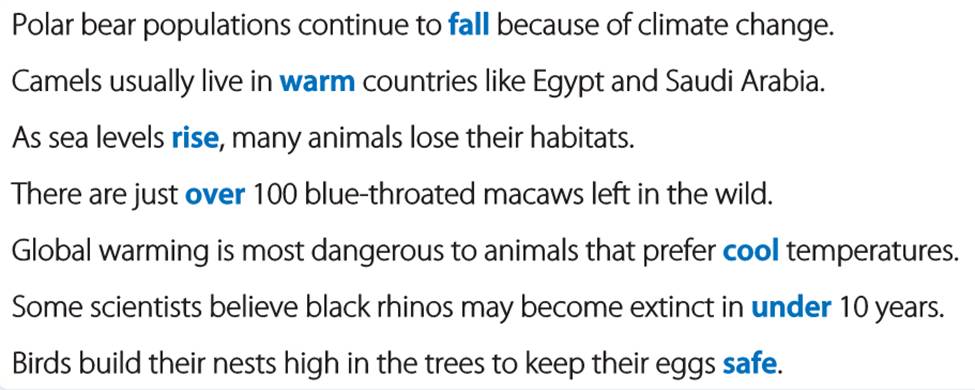Complete the diagram with words in 1.

Read the article again and complete the diagram with information from the text. Use no more than TWO words for each answer.

1. support
2. operate
3. green space
4. transport systems
Label the diagram with the words in the box.
| condensation evaporation precipitation water returns to the sea |

1. water returns to the sea
2. evaporation
3. condensation
4. precipitation
QUIZ. Work in groups.
Complete the diagram of the history of communication technology with the words and phrases from the box.
carrier pigeon telephone mobile phone social network |

1. carrier pigeon
2. telephone
3. mobile phone
4. social network
1. carrier pigeon
2. telephone
3. mobile phone
4. social network
5th century: (1) carrier pigeon
(Thế kỉ thứ 5: bồ câu đưa thư)
15th century: printed newspaper
(Thế kỉ 15: báo giấy)
19th century: (2) telephone
(Thế kỉ 19: điện thoại bàn)
1973: First (3) mobile phone
(1973: điện thoại di động đầu tiên)
1997: First (4) social network
(1997: mạng xã hội đầu tiên)
Read the text below and complete the diagram. Use no more than THREE words for each gap.
American parents usually encourage independence in their teenage children, and it is normal for teens to want more responsibility and freedom for their choices.
American teenagers often start high school with a basic plan of classes they need to take to get a high school diploma. Some subjects like English, maths, science, or social studies are required, others can be selected. Schools also provide extracurricular activities, such as sports, clubs, and bands. American teenagers who plan to go to college study hard to get good grades. They are highly motivated and very confident, and take responsibility for their learning.
Many American teenagers have part-time jobs as they want to gain work experience and learn how to manage their money. Many teens work at fast-food restaurants and stores, or do babysitting, and dog walking for neighbours. They also volunteer at local hospitals, food banks, and old people's homes, or take part in clean-up activities to improve their neighbourhood. This community service counts towards the volunteer hours that some schools require for university admission.
The teenage years form an important period of their development that influences adult life. The main goal of this period for most American teenagers is becoming independent, and they work hard both at school and outside school to achieve this goal.

1 - English | 2 - sports, clubs | 3 - fast-food restaurants | 4 - local hospitals |
Work in pairs. Complete the diagram with the ideas below.
A. Quality of life will be improved thanks to the cleaner environment.
B. There will be no private vehicles because people will use public transport.
C. Green skyscrapers will replace old blocks of flats and offices in crowded urban centres.

Please help me.
1. Complete the words 1-6 with correct prefixes.

2. Complete the table by adding the correct prefix bi-, multi-, re-, pre-, semi-, or counter-, un-, im-, dis-, in-, ir- to the words.

1/
1. irregular
2. multi-
3. unlikely
4. rethink
5. irresponsible
6. unreasonable
2/
1. preview
2. unproductive, counterproductive
3. semi-final
4. multinational
5. recreate
6. bilingual
7. inequality
8. distrust
9. imperfect
10. irresponsible
Exercise 1: The words in blue below are used in the reading passage on pages 95–96. Which of these words are antonyms (words with opposite meanings)? Complete the sentences.

1. Answer: is the opposite of in danger.
2. Answer: is the opposite of fall.
3. Answer: is the opposite of warm.
4. Answer: is the opposite of under
IV. Complete the sentences, using the words with the given letter.
1. Days in winter are s………………… than those in summer.
II. Complete the passage with the words given. ( 1,5 ms )
with negative Thirdly for In factories |
I disagree (1)___________ the idea that robots will only bring benefits to people in the future. Robots will also have some (2)_____________ influences. Firstly, they will be very expensive and we will spend too much money buying and fixing them. Secondly, robots in (3)___________will be able to do everything the workers do, so robots will make them jobless.(4)___________, robots in our homes will do all the housework (5)_____________ us, so we will become lazy and inactive. (6)____________ short, robots will do many things for us, but they may not improve the quality of our lives.
Find the words that need correcting.
1. Hundreds of houses destroyed after a tornado hit the small town of Texas.
A B C D
2. The earthquake occurred at midday when many people had had lunch.
A B C D
3. Water pollute in the lake has made the fish die.
A B C D.
4. Factories won’t dump waste into rivers if the government will fine them heavily.
A B C D
II. Complete the passage with the words given. ( 1,5 ms )
with negative Thirdly for In factories |
I disagree (1) with the idea that robots will only bring benefits to people in the future. Robots will also have some (2) negative influences. Firstly, they will be very expensive and we will spend too much money buying and fixing them. Secondly, robots in (3) in will be able to do everything the workers do, so robots will make them jobless.(4) Thirdly , robots in our homes will do all the housework (5) for us, so we will become lazy and inactive. (6) In short, robots will do many things for us, but they may not improve the quality of our lives.
Find the words that need correcting.
1. Hundreds of houses destroyed after a tornado hit the small town of Texas.
A B C D
destroyed => were destroyed
2. The earthquake occurred at midday when many people had had lunch.
A B C D
had had => were having
3. Water pollute in the lake has made the fish die.
A B C D.
pollute => pollution
4. Factories won’t dump waste into rivers if the government will fine them heavily.
A B C D
will fine => fines